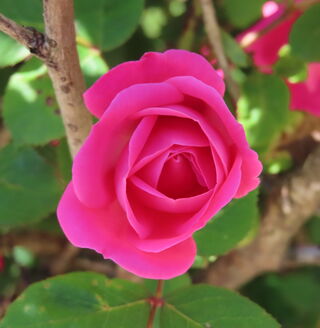Boredom
Why Poetry Matters Now—And Why It’s Gaining Readers
Once confined to the ivory tower, poetry is now surging in popularity.
Posted January 30, 2021

When I learned that Amanda Gorman had acquired a modeling agent and would be performing at this year’s Super Bowl, I could not help smiling.
Gorman is the 22-year-old poet who caused a sensation at the inauguration of President Biden when she read her poem, “The Hill We Climb.”
The poem itself was spectacular, but Gorman also won fans with her poised, evocative delivery; her references to the musical Hamilton, which has its own devoted fan base; and her elegant appearance and attire, including a bright yellow winter coat and a scarlet headband.
The interest Gorman sparked was measurable. Immediately after she spoke, the website of the Academy of American Poets saw a 250 percent increase in traffic compared with the same day in 2020.
The one-day increase—about 200,000 more visits—is the largest in the site’s 25 years, the academy reported.
I have been entranced by poetry since I was 12, when I received a paperback anthology titled A Concise Treasury of Great Poems.
I read it so avidly that the front and back covers eventually fell off. Undeterred, I wrapped the first and last pages in protective webs of Scotch tape and kept reading.
Inspired by this book, I wanted to be a poet when I grew up. In college I majored in English and wrote poetry; by my senior year, I had cranked out enough poems to be the featured student poet at a reading sponsored by the English department.
After college, I headed off to graduate school to study literature. I kept writing poetry, but by then I had concerns about the great gulf between academia, where poets generally lived then, and the rest of the world, which seemed full of problems in need of attention.
In addition, I could not dispel my mother’s concern that pursuing poetry would leave me penniless, with all of life’s finer things sacrificed upon the Altar of Literature.
Eventually, I made a course correction: In my mid-twenties, I shelved my poetry ambitions and became a journalist, hoping to use my love of writing to address the world’s problems.
Now that the field of American poetry has its own rock-star figure in Amanda Gorman, I can’t help but wish that my mother were still alive, so I could convey this startling, wonderful news to her.
As an inaugural poet, Gorman joined an exclusive club with just six members. Only four presidents have asked poets to read at their inaugurations: President Biden, President Kennedy in 1961, President Clinton in 1993 and 1997, and President Obama in 2009 and 2013.
The five other inaugural poets include Robert Frost in 1961 and Maya Angelou in 1993. Before Gorman, they were the most well-known.
Frost, who was 86 at Kennedy’s inauguration, was a literary lion who had won four Pulitzer Prizes. Angelou was a poet and also a memoirist, playwright, director, actor and civil rights activist.
Amanda Gorman’s celebrity status is clearly the result of her extraordinary talent and her remarkable presence. But she is also riding a wave of growing interest in poetry spurred in part by such seemingly incongruous allies as social media platforms, including Instagram.
Once confined largely to the rarefied realm of college English departments, poetry has come down from the ivory tower and burst out into the streets.
The typical poet is no longer a tweedy, pipe-smoking, middle-aged Caucasian man. Instead, American poets today reflect the great diversity of this country.
A 2018 National Endowment for the Arts study found that nationwide interest in poetry rose between 2012 and 2017—for the first time in the history of the NEA’s survey.
In particular, the NEA noted, “the share of 18-24 year-olds who read poetry more than doubled, placing this age group above all others when it comes to poetry-reading rates.”
Admittedly, the percentage of American adults reading poetry in 2017 was small—11.7 percent of those surveyed, or 27.9 million people. But in 2012 that figure was just 6.7 percent. The jump in interest in five years was a remarkable 76 percent, the NEA noted.
The study also found that, “Among racial/ethnic subgroups, African Americans, Asian Americans, and other non-white, non-Hispanic groups now read poetry at the highest rates overall. Further, poetry-reading increased among Hispanics and non-Hispanic whites.”
Experts have attributed poetry’s growing popularity to factors such as the NEA/Poetry Foundation’s Poetry Out Loud recitation competition for high school students; local poetry slams; and easy online access to poems and poetry performances via platforms such as Instagram and YouTube.
The wildly successful musical Hamilton, which premiered off-Broadway in February 2015 and moved to Broadway later that year, is likely another factor.
Creator and star Lin-Manuel Miranda wrote brilliant, incandescent lyrics that reference rap, hip-hop and classic Broadway shows, among other influences.
Setting those lyrics to mesmerizing music, he transformed the sometimes bloody, sometimes boring history of America’s Founding Fathers into riveting theater.
He also inspired a generation of young people obsessed with Hamilton to write their own lyrics, songs and poems inspired by American history.
In the six years since Hamilton premiered, the United States has witnessed three presidents in the White House; a devastating global pandemic that has sowed illness and death and hollowed out the economy; the rise of domestic terrorism groups; and a new chapter in the country’s long, painful reckoning with persistent, systemic racism.
The time has passed when poetry was the stuff of red, red roses and merry months of May—although in reality it was never so narrowly defined, except perhaps by bored students uninspired by the bards of bygone eras.
Poets today write about the most pressing issues facing our country—the stories we see on the evening news and in our city streets and rural towns.
As Amanda Gorman put it in her inaugural poem,
Because being American is more than a pride we inherit,
it’s the past we step into
and how we repair it
At a time when so much of life is perilous and fraught, poetry—as it is written now—may be the perfect vehicle to convey our urgent emotions.
The best poems combine the vivid imagery of art and the pulsing rhythms of music with the elemental strength of words stripped to their essence. They convey power; they give voice to human longing, suffering, joy and hope.
As U.S. Poet Laureate Joy Harjo puts it, “Without poetry, we lose our way.”
Copyright © 2021 by Susan Hooper




